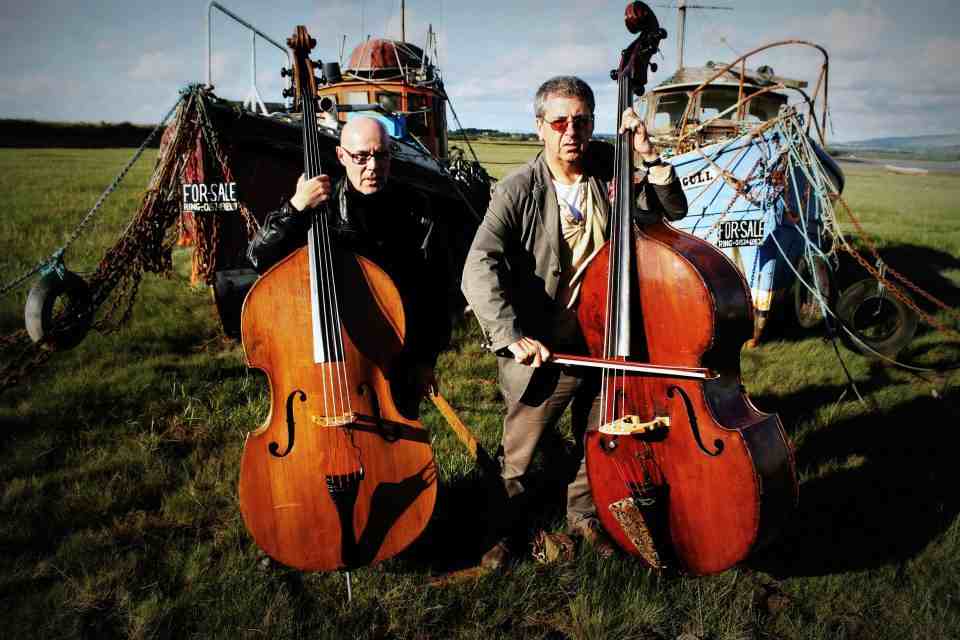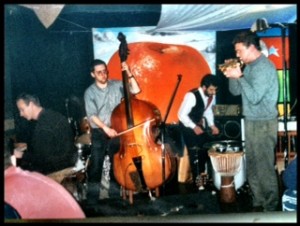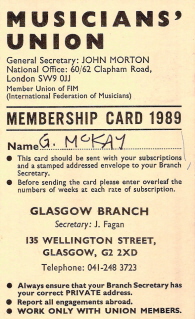Lancaster 2010-2015, new bass: Swerve Trio, Adverse Camber
Adverse Camber double bass duo, with Ken Johnston, at Sunderland Point, me with new-old bass, photo by Richard Davis 2012
In 2009-2010 I changed basses—I wonder if that was a bit of a lightweight mid-life crisis, I suppose, approaching 50 and all that. I determined to find for myself a really nice bass, and spent a year doing so. (Also I’d had a number of years, realistically approaching a decade, where I wasn’t really doing much musically—the day job, family life, as well as a health crisis that knocked me off track, other things taking up my time and energies. I had to decide whether I really was a musician any longer.) I sold my existing one, bought via double bassist Gill Alexander in Norfolk in the early 1980s, to a local orchestral player in Lancaster.
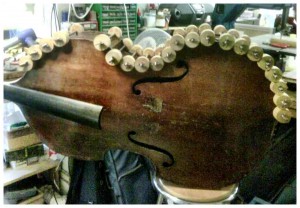
So now I have a mid-19th century German or just possibly English bass, which has a great sound I think, pizzicato or played with my Alfred Knoll bow, and Pirastro Evah Pirazzi light strings. What a burst of energy that old instrument has given me, generously making me sound good (to my ears)! I am musically revived. There was quite a bit of work to be done on the bass still to get it back to top form, so I visited my luthier at the Violin Shop in Blackpool quite regularly during this period.
UPDATE May 2011! My new bass is now completely and wonderfully restored, thanks to the work of luthier Simon Speed at the Violin Shop. I am quite thrilled with the way the bass sounds and looks, really, and cannot recommend Simon highly enough for his sympathetic and dedicated work.
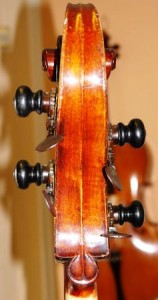
UPDATE September 2011! I have fitted the new bass with a new pick-up, a David Gage Realist pick-up. What a difference to particularly the quality of depth at the bottom end it makes. Hit bottom E, F or G and the room rocks like a BOOM-SHANKAH!
UPDATE December 2011! I have replaced my 30-year-old Polytone MiniBrute bass combo, with all its interior shaking around D and E flat, with a Gallien Krueger MB150 III combo, the lightweight aluminium-cased one with a powerful punch. Now, new bass, pick-up and amp, I am completely set up for the phone to start ringing again. As my dad used to say when his phone rang, quoting alto saxophonist Mike Osborne who he’d got to know following Ozzie’s retreat from the London scene to Norfolk to try to sort himself out, ‘It’s a gig! It’s a gig!’
UPDATE December 2021! I put my bass in hands of master bass luthier Martyn Bailey, from Essex. Martyn listened carefully to my needs and then skilfully planed the fingerboard, new top nut, new (adjustable) bridge, removed the belly and fixed all the cracks and old repairs, various other things. The key trick was of lowering the action (thus easing playing) without losing the sound. An absolute magician. BTW the bass is definitely German, Martyn tells me.
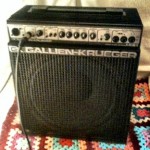
For my final main bands in Lancaster— these were Adverse Camber double bass duo (later trio with drums), Swerve Trio (soprano sax, drums, bass)—see the dropdown pages under this Music section. I did other things too, odd interesting invitations, collaborations. The film below shows part of one such, an ‘improvatorio’ for voices and strings, freely improvised, by Deep Cabaret Vox (aka Steve Lewis, the one in the colourful shirt), from Lancaster Jazz Festival 2011. I was part of the bass section for this, great fun, with Ken Johnston and Dave Tomkins. To my great pleasure one of the singers Steve invited in was my old CME pal Mary Keith, lovely to see and play with her again.
Lancaster and the north-west 1990s-early 2000s
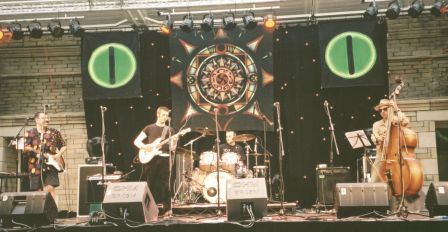
In a book I co-edited a few years ago with Pete Moser from More Music, Community Music: A Handbook, there’s a great chapter by Martin Milner on ‘Bandwork’. It opens with the observation that ‘Bands are a vital part of our culture, and … they constitute one of our most persistent contemporary models of music-making’. At the end of his chapter Milner suggests that musicians produce what he calls their ‘personal bandwagon’, a list of the bands you’ve been in over the years, with a bit of description, possibly including an effort to articulate what you got out of it and put into it. He writes that this is a specially useful exercise ‘for those musicians who are (as actors say) “resting” between gigs and bands–think of it as a morale booster rather than a litany of failure 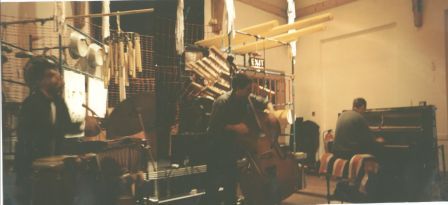 though…’. In many ways this is my personal bandwagon. And I agree with Milner’s conclusion: ‘When I think about these bands, and my part in them, I realise how much I got out of them, how many switched-on people I met through them and how much I learned about myself and others, above and beyond any musical learning’.
though…’. In many ways this is my personal bandwagon. And I agree with Milner’s conclusion: ‘When I think about these bands, and my part in them, I realise how much I got out of them, how many switched-on people I met through them and how much I learned about myself and others, above and beyond any musical learning’.
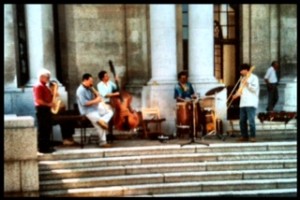
Charivari (1994-97) was a free improvising trio feat. Stephen Grew (piano), Steve Lewis (voice, percussion), me on bass. Club and cabaret nights, with poets and other artists. My dad joined us on alto one one or two of these evenings when he visited. I spent most of my time trying to keep up with Stephen.
Orchestra of Dreams. This was a bigger improvised band formed with some players from Manchester for the purpose of an Arts Council-supported tour of England in 1993.
Pete Moser. I was bassist on one or two of his musical projects coming out of Welfare State International and More Music Morecambe. This included a 1992 residency at the Dukes Theatre, Lancaster playing Pete’s settings of poems by Adrian Mitchell, a big evening festival gig on an outdoor stage facing Morecambe Winter Gardens theatre (the bass boomed back off the theatre frontage during a solo, amazing sound), and in 1996-98 a short tour and recording with massed choirs of his song cycle, Flights of Passage. For the latter I remember in particular a lovely gig at Leighton Moss RSPB reserve, and another with massed choirs at Lancaster Town Hall.
A trio playing African pop-inspired original songs by Steve Lewis (voice, percussion), with a guitarist. His name and the band’s currently totally elude me. I do remember in particular a special gig at the Brewery Arts Centre in Kendal. There’s film footage of it somewhere.
Irregardless. 2001-02. Quartet playing jazzy pop songs, feat. Steve Lewis, Ben McCabe (drums), Sam Dale (guitar). Some nice gigs, inc. at the Lanternhouse Arts Centre in Ulverston, and at the World Music Festival in Morecambe one summer. I think we were supported with some Lancashire rural arts funding. Sadly this band didn’t really end well for me, and it knocked my confidence for a few years, just when I feared my neuro body might be going to end my music-playing anyway. Gladly I bounced back, and adapted my playing. Should write about that sometime, the adaptation, not the asshole.
Glasgow 1980s-1990s
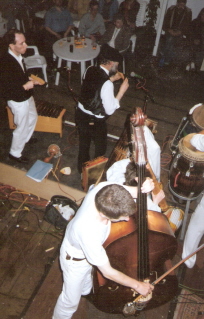
I was (back) in Glasgow in the late 1980s / early 1990s, doing my PhD at the university. Played a lot of music there, leading a quartet and a duo under my own name, and as a bassist in others’ bands too. For the quartet—with Crawford McCallum (g), Matt Jenkins (ts, ss), Nick Weston (d)—I ended up writing much of the material, some of which wasn’t too dreadful. In fact, I’ve gone back to that book of compositions in the past year or two to play in new situations. Glasgow was European City of Culture in 1990 so there was a bit of work around for everyone. During the annual Glasgow Jazz Festival we always got some gigs too.
One of the main bands I was in was called Atsimevu, a big drum ork, with me on bass, talking drum and balafon; I remember one year we did a community tour of Glasgow estates and processions during Mayfest, and we played some major venues too—the Tramway on the South Side, and Partick Town Hall. We did a tv show once, playing live (anyone got the footage?).
I was bassist for John Longbotham RIP for his trio for a while too (with George Burt on guitar)—he was probably technically the best alto player I’d ever played with, and wrote some fabulous music, when he was on form and balance.
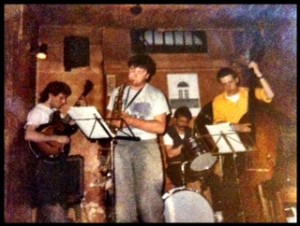
Norwich 1980s
I worked as a community musician in the mid-1980s, originally one a government scheme to reduce the unemployment figures. 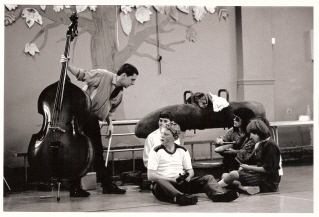 Working with Community Music East I did learn about music of course—particularly how to count, and how to listen, and just benefitted from the general discipline of regular playing to sharpen up the chops—but also I learned about teaching, how to teach, that was important bearing in mind me going on to become a university lecturer. I was in the first tranche of people employed by CME, and worked alongside
Working with Community Music East I did learn about music of course—particularly how to count, and how to listen, and just benefitted from the general discipline of regular playing to sharpen up the chops—but also I learned about teaching, how to teach, that was important bearing in mind me going on to become a university lecturer. I was in the first tranche of people employed by CME, and worked alongside 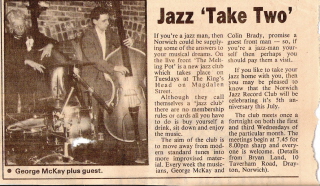 good and wonderful musicians—they were all better than me by far—like Ben Higham (trumpet, tuba), Mary Keith (flute), Gill Alexander (bass), Sian Croose (voice), Will Lorenzo (drums, RIP), Pete Beresford (piano), Pete Kitson (drums), Steve Clarke (tenor sax). Some, er, characters there too, you know.
good and wonderful musicians—they were all better than me by far—like Ben Higham (trumpet, tuba), Mary Keith (flute), Gill Alexander (bass), Sian Croose (voice), Will Lorenzo (drums, RIP), Pete Beresford (piano), Pete Kitson (drums), Steve Clarke (tenor sax). Some, er, characters there too, you know.
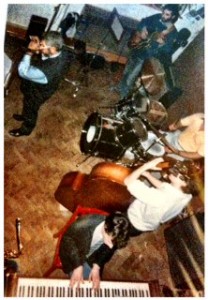 Apart from all the stuff with CME, some of the main music-playing memories I have from those days are from playing with my dad, also George McKay (RIP). When we played together he was mostly on alto, bari and flute. I really loved playing with him, he was such a forceful player—by which I think I mean that his tone, especially on alto, was both forceful and lyrical. His solos sometimes blew me away, just as they’d done when I was a kid and would listen to him practise (there was no escape). With hindsight I wasn’t really then quite good enough to play with his bands during these years, but we’d do gigs, quintet, quartet, duo (bari and bass was so great). I learned on his stand.
Apart from all the stuff with CME, some of the main music-playing memories I have from those days are from playing with my dad, also George McKay (RIP). When we played together he was mostly on alto, bari and flute. I really loved playing with him, he was such a forceful player—by which I think I mean that his tone, especially on alto, was both forceful and lyrical. His solos sometimes blew me away, just as they’d done when I was a kid and would listen to him practise (there was no escape). With hindsight I wasn’t really then quite good enough to play with his bands during these years, but we’d do gigs, quintet, quartet, duo (bari and bass was so great). I learned on his stand.
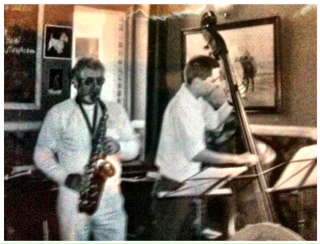
I was bassist in the Simon Youngman Quintet too, playing modern standards, and had a sax/bass duo with tenor player Steve Clark from CME.
I ran a weekly jazz and improvising club called The Melting Pot in the back room of the King’s Head pub in Norwich for a while. Mostly it was my dad and me, and then anyone else I could rope in for almost no money. Sometimes that was quite musically wild and exciting.
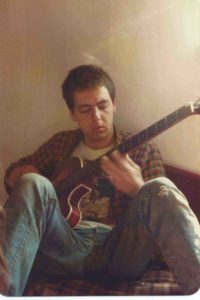
I had a reggae/blues jamming band with old north Norfolk mates called The Last Blast that actually did play a gig (yes, one). That gig was for the launch party of Ronaldo’s Ice Cream Company. The Last Blast (those were nuclear times) rehearsed quite a lot though, which meant getting very stoned and playing loudly for hours. It was a good gig, short but intense.

